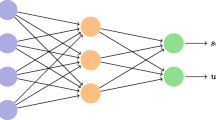Abstract
In this paper we describe a modeling framework aimed at facilitating the customization and deployment of artificial intelligence (AI) scheduling technology in real-world contexts. Specifically, we describe an architecture aimed at facilitating software product line development in the context of scheduling systems. The framework is based on two layers of abstraction: a first layer providing an interface with the scheduling technology, on top of which we define a formalism to abstract domain-specific concepts. We show how this two-layer modeling framework provides a versatile formalism for defining user-oriented problem abstractions, which is pivotal for facilitating interaction between domain experts and technologists. Moreover, we describe a graphical user interface (GUI)-enhanced tool which allows the domain expert to interact with the underlying core scheduling technology in domain-specific terms. This is achieved by automatically instantiating an abstract GUI template on top of the second modeling layer.
Similar content being viewed by others
References
Anastasopoulos M, Bayer J, Flege O, Gacek C (2000) A process for product line architecture creation and evaluation. Technical report, PuLSE-DSSA version 2.0. Technical report IESE report no. 038.00/E, Fraunhofer Institute for Experimental Software Engineering (IESE)
Bahadori S, Cesta A, Iocchi L, Leone G, Nardi D, Pecora F, Rasconi R, Scozzafava L (2004) Towards ambient intelligence for the domestic care of the elderly. In: Remagnino P, Foresti G, Ellis T (eds.) Ambient intelligence: a novel paradigm, Springer, Berlin Heidelberg New York
Bhansali S (1996) A knowledge-assisted approach to parameterized reuse. Int J Softw Eng Knowl Eng 6:641–671
Brucker P, Drexl A, Mohring R, Neumann K, Pesch E (1998) Resource-constrained project scheduling: notation, classification, models, and methods. Eur J Oper Res 112:3–412
Carnegie Mellon University, Software Engineering Institute (2006) A framework for software product line practice, version 4.2: http://www.sei.cmu.edu/productlines/framework.html
Cesta A, Rasconi R (2003) Execution monitoring and schedule revision for O-OSCAR: a preliminary report. In: Proceedings of the workshop on online constraint solving at CP-03. Kinsale Co., Cork
Cesta A, Bazzica P, Casonato G (1997) An object-oriented scheduling architecture for managing the data relay satellite requests. In: Proceedings of the international workshop on planning and scheduling for space exploration and science. Jet Propulsion Laboratory Internal Report. Oxford, CA, October 28–30, 1997
Cesta A, Cortellessa G, Oddi A, Policella N, Susi A (2001) A constraint-based architecture for flexible support to activity scheduling. In: Floriana Esposito (ed.) Lecture Notes in Artificial Intelligence (LNAI), Lecture Notes in Computer Science (LNCS), Springer, Vol. 2175 3-540-42601-9
Cesta A, Oddi A, Smith S (2002) A constrained-based Lecture notes in computer science (LNCs), Springer, Vol. 2175, 3-540-42601-9 for project scheduling with time windows. J Heuristics 8(1):109–135
Cesta A, Cortellessa G, Pecora F, Rasconi R (2005a) Mediating the knowledge of end-users and technologists: a problem in the development of scheduling technology. In: Proceedings of the IASTED international conference on artificial intelligence and applications (AIA 2005). Innsbruck, Austria, pp. 14–16
Cesta A, Farinelli A, Iocchi L, Leone G, Nardi D, Pecora F, Rasconi R (2005b) Robotically rich environments for supporting elderly people at home: the RoboCare experience. In: Proceedings of the AISB'05 workshop on Robot companions. University of Hertfordshire. Hatfield, UK
Dechter R, Meiri I, Pearl J (1991) Temporal constraint networks. Artif Intell 49:61–95
Gomaa H (1995) Reusable software requirements and architectures for families of systems. J Syst Softw 28(3):189–202, DOI http://dx.doi.org/10.1016/0164-1212(94)00056-S
Kolisch R, Schwindt C, Sprecher A (1998) Benchmark instances for project scheduling problems. In: Weglarz J (ed.) Project scheduling–-recent models, algorithms and applications. Kluwer, Boston, pp. 192–212
McCluskey T, Liu D, Simpson R (2003) GIPO II: HTN planning in a tool-supported knowledge engineering environment. In: Proceedings of ICAPS'03, Trento (Italy), AAAI, Palo Alto, CA
Muscettola N (1994) HSTS: Integrating planning and scheduling. In: Zweben M, Fox MS (eds) Intelligent scheduling, Morgan Kaufmann, San Fransciso, pp. 169–212
Muscettola N, Smith S, Cesta A, D'Aloisi D (1992) Coordinating space telescope operations in an integrated planning and scheduling framework. IEEE Control Syst 12(1):28–37
Oddi A, Policella N, Cesta A, Cortellessa G (2003) Generating high quality schedules for a spacecraft memory downlink problem. In: Principles and practice of constraint programming—CP 2003, 9th international conference, CP 2003, Kinsale, Ireland, September 29—October 3, vol. 2833. Lecture Notes in Computer Science, Springer, Berlin Heidelberg New York, pp. 570–584
Schwindt C (1998) Generation of resource-constrained project scheduling problems subject to temporal consraints. Technical report, Universität Karlsruhe, Report WIOR-543
Smith S, Becker M (1997) An ontology for constructing scheduling systems. In: Working notes of 1997 AAAI symposium on ontological engineering. AAAI, Palo Alto, CA
Smith S, Lassila O, Becker M (1996) Configurable, mixed-initiative systems for planning and scheduling. In: Tate A (ed.) Advanced planning technology. AAAI, Menlo Park, CA
Smith S, Hildum D, Crimm D (2003) Interactive resource management in the comirem planner. In: IJCAI-03 workshop on mixed-initiative intelligent systems, Acapulco, Mexico
Van Hentenryck P, Michel L (2004) Scheduling Abstractions for local search. In: Proceedings of CP-AI-OR'04, Nice, France
Weiss DM, Lai CTR (1999) Software product-line engineering: a family based software development process. Addison Wesley, Reading
Author information
Authors and Affiliations
Corresponding author
Rights and permissions
About this article
Cite this article
Pecora, F., Rasconi, R., Cortellessa, G. et al. User-oriented problem abstractions in scheduling. Innovations Syst Softw Eng 2, 1–16 (2006). https://doi.org/10.1007/s11334-006-0022-8
Received:
Accepted:
Published:
Issue Date:
DOI: https://doi.org/10.1007/s11334-006-0022-8




